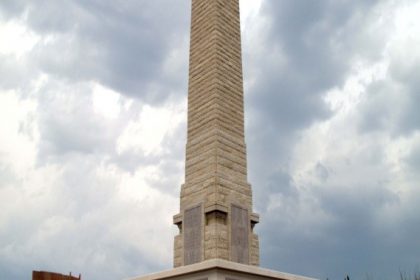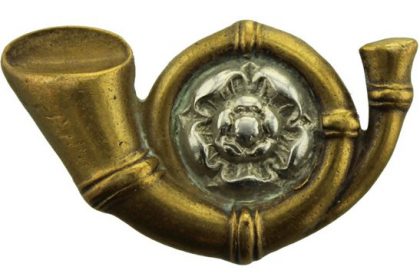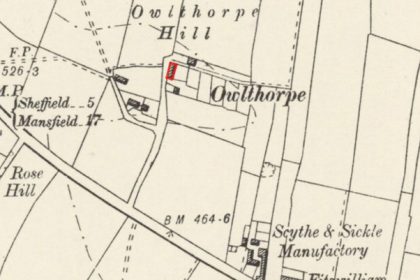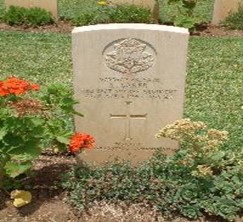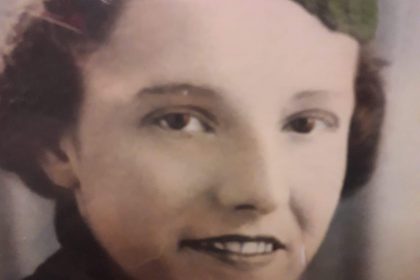Edinburgh Evening News – Wednesday 16 July 1873
At the Derbyshire Assizes, yesterday, before Mr Justice Pollock, Benjamin Hudson, aged 24, a collier, was indicted for the wilful murder of his wife, Eliza Hudson, at Handley, near Eckington, Derbyshire, on the 24th April last 1873.
The murderer and his wife were also cousins, and had two children, but for some length of time previous to the murder they bad lived unhappily together, and on the 20th April the deceased had summoned her husband for using threats towards her.
It appears that Mrs Hudson had been out washing, and on returning to Handley through Bowman Lane, between eight and nine o’clock at night, she was followed her husband, who attacked her with hedge stake. His attack was so violent that he broke her skull, knocked out her teeth, and one portion of her head was entirely cut away and battered into the earth. The poor woman’s death was almost instantaneous.
Even after his apprehension the prisoner seems to have had no feelings of regret, for, in reply to a question put to him, his only remark was, ” Well, I have ended the job.” The hedges take was broken by the violence with which the attack was made and bore evidence of the savageness of the assault which the unfortunate wife was brought to her untimely end. The prisoner was sentenced to death.
THE HANDLEY MURDER. EXECUTION AT DERBY. (From our men Reporter.) Benjamin Hudson was hanged Derby gaol yesterday morning for the murder Eliza Hudson, his wife, at Handley, on the evening of April 24th, just fourteen weeks a
nd four days ago. The circumstances of the crime and the antecedents of the murderer and his victim—already fully recorded in the columns of this paper—areas sad as they are shocking. When the deed was committed Hudson had only reached the age of 24 years, his unfortunate wife was few months younger, and they had been married about three years. They were cousins, and hail been intimate with each from infancy, his mother and her father being brother and sister. While yet a child he displayed passionate fondness for her, and his affection was in measure reciprocated; but as each advanced in years the attachment on his part developed into kind of frenzy, accompanied by violent outbreaks of jealousy, and she learned rather to fear than to love him. Having had no education whatever beyond what he received during a casual attendance a Sunday school, and having become independent of parental control and worker in the coal mines at very early age, grew up into an idle, ignorant, selfish and cruel-hearted man. His being an illegitimate will probably account in some degree for the negligent manner which he was brought up. As to the wretched woman who became his wife, her moral character may inferred from the fact that she became the mother two illegitimate children, and was near her confinement of third at the time of her marriage, Hudson himself being the father of the second.
Notwithstanding this, however, she seems to have been hardworking and industrious woman, and to have shown every disposition to live on amicable terms with her husband. Her earnings charwoman often served to maintain herself and children when he, through indolence, was out of employment. Before the marriage he terrorised over her by his jealous watchfulness her movements; and after they were united he commenced course of ill treatment which ended in the dreadful tragedy of her death. Within a few months of their marriage she was compelled to have him bound over to keep the peace for three months, and last year he actually suffered imprisonment for that period on account of his cruel conduct towards her, being again bound over after that for six months.
About a fortnight before the murder he committed violent assault upon her, consequence of which she with her three children left the cottage Lightwood which had been her unhappy home, and went to live with her father, collier, of Handley, mile and a half distant. For his conduct on this occasion, Hudson was summoned to appear before the magistrates at Eckington on Monday, April 21st, but through the interposition his solicitor, the case was arranged out of court, he agreeing to separation and to allow her 5s. a week for the support of the children. He had then been out of work several weeks, and having left his cottage and sold his furniture, he led kind of vagrant life. His father a colliery topman, residing at Whittington, only a few miles from but he does not seem to have gone to him. Four days after the arrangement to separate from his wife. Hudson committed the murder. He waylaid the woman in the field path between Middle and West Handley she was returning to her father’s house, after day’s washing for one of her old neighbours at
Lightwood, and there took her life by beating her about the head, face, and throat with a hedge stake. That his was the hand which inflicted the fatal blows there can be no doubt, for immediately after the deed he went to his relatives at West Handley, less than half a mile from the spot, and admitted that he had done for Eliza,” and about hour later when apprehended by Police constable Hukin again acknowledged his guilt.
Then followed his committal to Derby assizes on the charge of wilful murder, first on the coroner’s warrant and then by a county justice. His trial took place on July loth, before Mr. Justice Honyman, and though his advocate, Mr. Waddy, made most powerful appeal on his behalf, urging” the possibility of provocation and non pre-meditation, the jury found him guilty of the capital offence, recommending him to mercy, however, on account of the unhappy life he had led with his wife. The scene in court when sentence was passed was affecting in the extreme. Mr. Coleridge, the Deputy Clerk of Assize, in putting the usual question to the prisoner to whether had anything to say why sentence of death should not be passed upon him completely broke down with emotion, and Mr. Justice Honyman in pronouncing judgment, was painfully overcome, sobbing at every other word. Perhaps the person court who was unmoved was the prisoner himself. His demeanour, in fact, the tune of his apprehension to the moment of his showed an astounding absence of emotion. Until by the magistrates, he seemed to glory in it what he had done; after that tune to the end his manner was quiet and sullen, and he betrayed not the least symptom of excitement or anxiety.
Since condemnation the chaplain of the gaol, the Rev H Moore, has been most unremitting his endeavours to prepare the culprit’s for the awful fate which awaited him ; but Hudson, though he paid respectful attention to the instruction and advice given by the rev gentleman, seemed incapable of receiving any real religious impression, and was never brought to condition in which it was deemed proper to administer the Holy Sacrament.
He seldom spoke on any object unless questioned and sometimes the query had. be repeated before would reply. Early last victim having taken her life, manifest any remorse Hudson and On Thursday last he visited by John Hudson and Mrs Hudson an uncle and aunt, from West Handley and on Saturday upwards of a dozen of his relatives and friends from the same neighbourhood came bid him farewell, including Richard Hudson his grandfather; Mary Vickers his mother; Henry and Alfred Vickers, his brothers; Eliza and Ann Vickers, his sisters. George Coupe and Mrs. Coupe is uncle and aunt; Frederick Vickers and his wife, his brother and sister law; and another uncle named John Hudson and his wife. Certain acquaintances also applied for admission to the cell, but as the culprit did not express any desire to see them they were not allowed an interview.
The farewell scene is said not to have been so painful as might have been expected, easy expression of emotion evidently not bring a characteristic of the family – a fact which was also very the evidence taken at the trial.
BNA copywrite – Edinburgh Evening News – Wednesday 16 July 1873

